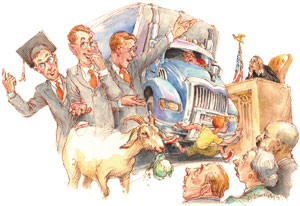That's a Good One: Effective Trial Lawyers Know How to Tell a Good Story

Illustration by John Schmelzer
“A great story is like a well-crafted joke—deliciously brief, immediately memorable, eminently repeatable and virtually impossible to dismiss.” —Kenneth Albers, actor and director
Whether written or oral, stories are essential to virtually every part of litigation—from opening statements to direct and cross-examinations to final arguments, written briefs and the give-and-take between lawyers and judges in the middle of an appellate argument.
Which means lawyers who want to become effective communicators must understand that stories are at the heart of how people think, learn, exchange ideas and struggle to understand the world around them.
Good stories are not just snapshots of isolated events. Stories deal with the interrelationships that show how people think and how the world works. Stories are at the very heart of what the law is all about.
So it was only natural that at some point our local bar association’s monthly program would be about stories—and that Angus and Judge Horatio Standwell would plan the event and lead the discussion.
Right at 7:30 last Wednesday evening, Judge Standwell opened the program with this question: “What do we all have to continually unlearn from our law school training to be able to effectively try real cases
“After all,” he said, “almost everything the law deals with—just as almost everything medicine deals with—is both important and inherently interesting. The problem is that both lawyers and doctors have been carefully taught to speak and write in tongues, to hide our ideas so that only the elite can share them.”
“First,” said Angus, “we had to become bilingual. We had to learn enough legalese to begin with so we could read and understand old appellate decisions in law school casebooks.”
“But the trouble is,” said Judge Standwell, “when we were in law school, we thought learning to talk like lawyers made us special.
“And it does. It makes us specially annoying. The real challenge is to learn how to talk about difficult legal topics and problems using ordinary, everyday English so that any juror snatched off the streets to serve on a case can understand what we’re talking about.”
Click to read the rest of “That’s a Good One” from the April issue of the ABA Journal.



